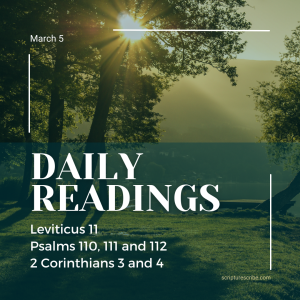
Tuesday Mar 04, 2025
Thoughts on the readings for March 5th (Leviticus 11; Psalms 110, 111, 112; 2 Corinthians 3, 4)
Leviticus chapters 11-15 deal with the laws of uncleanness. Chapter deals with regulations telling of “clean” and “unclean” animals (ceremonially speaking). Verses 1-23 of Leviticus 11 tell of uncleanness in relation to eating; verses 2-8 beasts of the earth; verses 9-12 creatures of the waters; verses 13-19 fowls of the air; verses 20-23 insects. Verses 24-40 speak of defilement by contact with dead bodies; verses 24-38 Defilement by the dead bodies of unclean animals. (Eight species of unclean animals that are especially defiling and whose bodies defile not only individuals but also inanimate objects on which they fall). Verses 39-40 describe the defilement of the dead bodies of the clean animals. Verses 41-47 provide a summary and an appeal for holiness.
Psalm 110 is one of the greatest of the Messianic Psalms in the Psalter. It was written by David, who acted en the part of a protracted parable about the Messiah. This parable is recorded in 2 Samuel chapters 6-8. The events spoken of in
2 Samuel 8 are recorded out of chronological order. Samuel has presented the story of the Messiah’s elevation to the right hand of the Majesty in the heavens; his return to earth and the subjecting of the earth during Messiah’s kingdom rule. In Psalm 110 David, by the Holy Spirit, tells of these events, which were in part experienced by David. Brother Stephen Palmer spoke at the Rathmines Bible School about this Psalm. Brother Stephen showed how remarkable is the verbal inspiration of the Scriptures. Every word from the Psalm is quoted in the New Testament in a variety of contexts. The Lord Jesus uses the opening words from the Psalm to prove that he is the divine Son of God (Matthew 22 verses 41-45). Peter uses the same verses in his Pentecost address to show the authority that God has invested in His Son
(Acts 2 verses 32-36). The Psalm implies that Messiah would be rejected at the hands of the Jewish leaders, “Thy people shall be willing in the day of thy power” (co. John 1verses 10-12). The Psalm tells of the Son awaiting the Father’s command to return to the Earth, “until I make thy foes thy footstool”
(a fulfilling of the Abrahamic promise Genesis 22 verse 17 compare. Romans 4 verse 13). The word “UNTIL” becomes the lynchpin of the Apostolic preaching about the second coming of the Christ (Acts 3 verses 19-26). The writer to the Hebrews picks up many of these themes in their Book eg. Hebrews 1 verses 1-4. The Psalm then deals with the returned Jesus, as Judah’s conquering lion, subduing the earth. One of his first great victories will be over the northern confederacy invading Israel. The word translated “head” (verse 7) is a proper noun – Rosh (speaking of Russia soon to invade Israel s the head of a mighty confederacy) – in the Hebrew language. Jesus will be a King-Priest upon his throne; after the order and type presented in Genesis 14; 2 Samuel 6-8; and Hebrews chapters 5-7. Ponder these matters and be instructed.
Psalm 111 deals with the greatness of the LORD’s deeds. Note verse 1 that the writer is wholehearted in his praise for the Almighty; as are all of the faithful. The LORD’s deeds are splendid and a cause of wonder. Highlighted in verses 3 and 4 are His righteousness and His mercy
(Romans 11 verses 22-23). Yahweh’s care and His kindness are celebrated in verses 5-6. His redemptive work for His people are spoken of in Vv7-9. And the sun total of the advice for the devout faithful is told in verses 10. Read aloud slowly. Pause and ponder together with Proverbs 1 verses 2-7.
Psalm 112 addresses the theme that the righteous will never be moved. The Psalm is linked to 111 as it begins where the previous Psalm finishes. Prioritise your reverence for your Sovereign. Verses 2-9 outline the benefits that flow for the faithful. It is not what we deserve, but is graciously given by God, because of who He is. And the righteous reciprocate God’s love in generous acts as verse 5 tells. The Apostle Paul alludes to this verse in 2 Corinthians 8. Only the faithful will flourish; and finally the wicked will perish (Psalm 37).
In 2 Corinthians 3 Paul tells of God’s great work in him as an administrator of the new covenant in our Lord Jesus Christ. Unlike the Mosaic covenant that was written upon stone tablets, the new covenant is engraved on the fleshy tables of the heart. The mediator of the former covenant had to wear a veil over his face so that Israel would not perceive the transient nature of the glory which glowed every time he went in before the LORD and began fading soon after. But as believers we behold the open and glorious face of our Lord Jesus Christ and are being transformed from one level of glory to another. The transforming power of the Gospel is further developed in chapter 4. The message is unmistakable to those having ears to hear; but unintelligible to the hard hearted. The Almighty chose to reveal His power – of salvation to those who believe the gospel – through He reveals it in flawed human vessels. God does this so the transforming power is seen as His, and not from us: Romans 1 verses 16-17. The illustration Paul presents is based on the story of Gideon in Judges 7 verses 19-23. What a contrast exists between our transient light affliction and the great weight of glory reserved for believers – the Greek word for weight is identical to that of glory. Read verses Read v17-18 aloud. Pause and Ponder.
No comments yet. Be the first to say something!